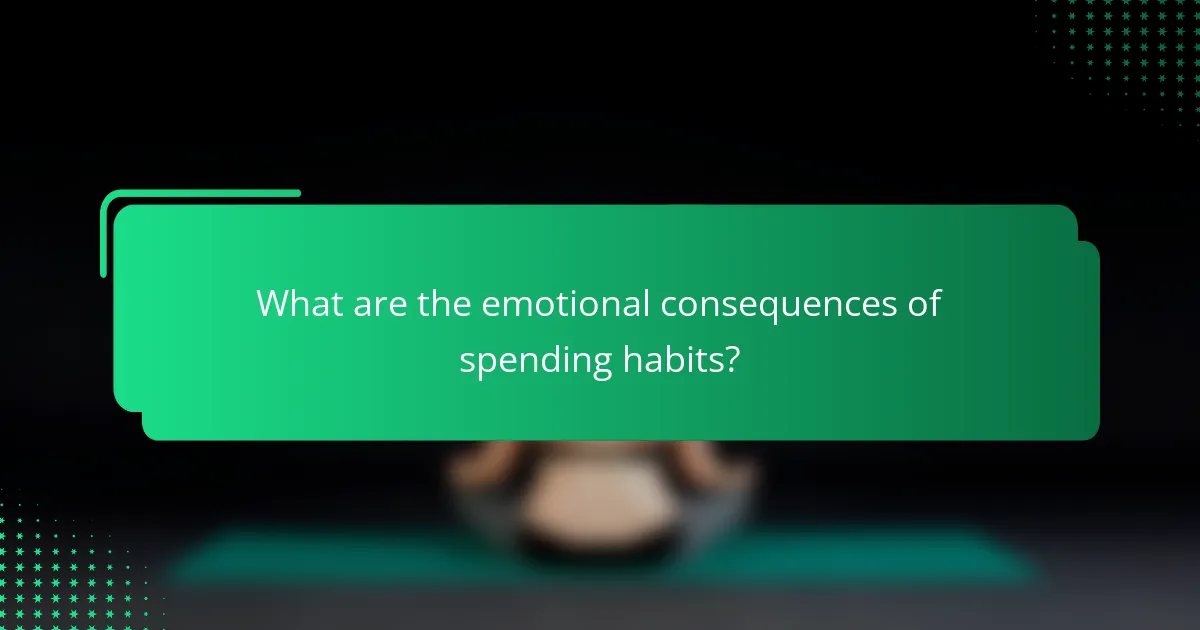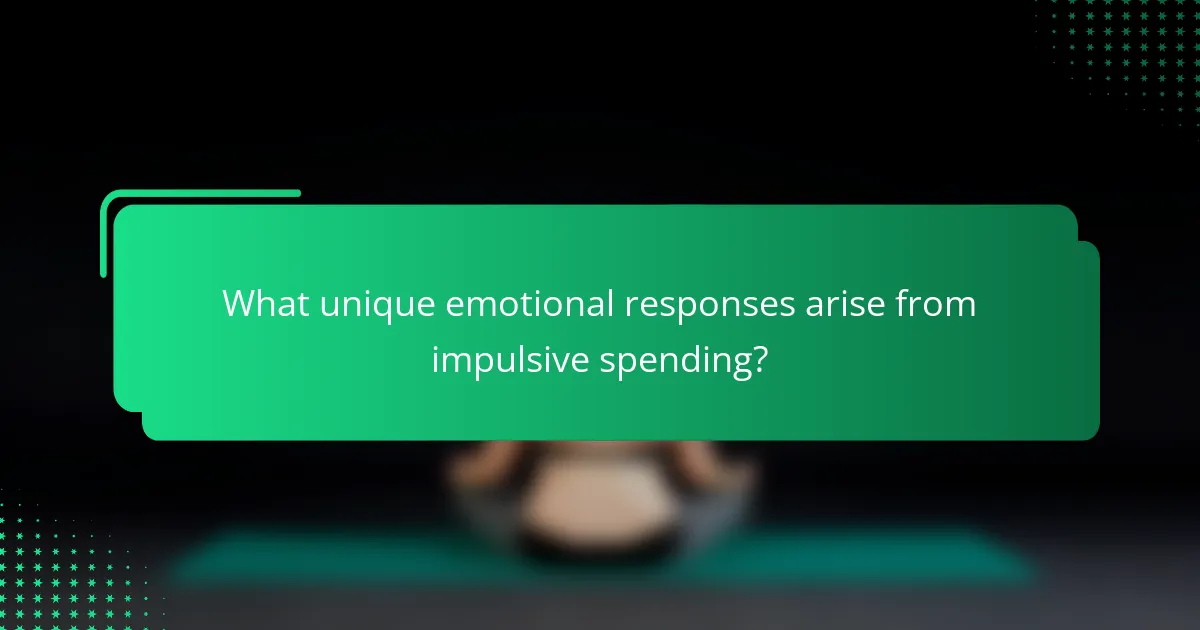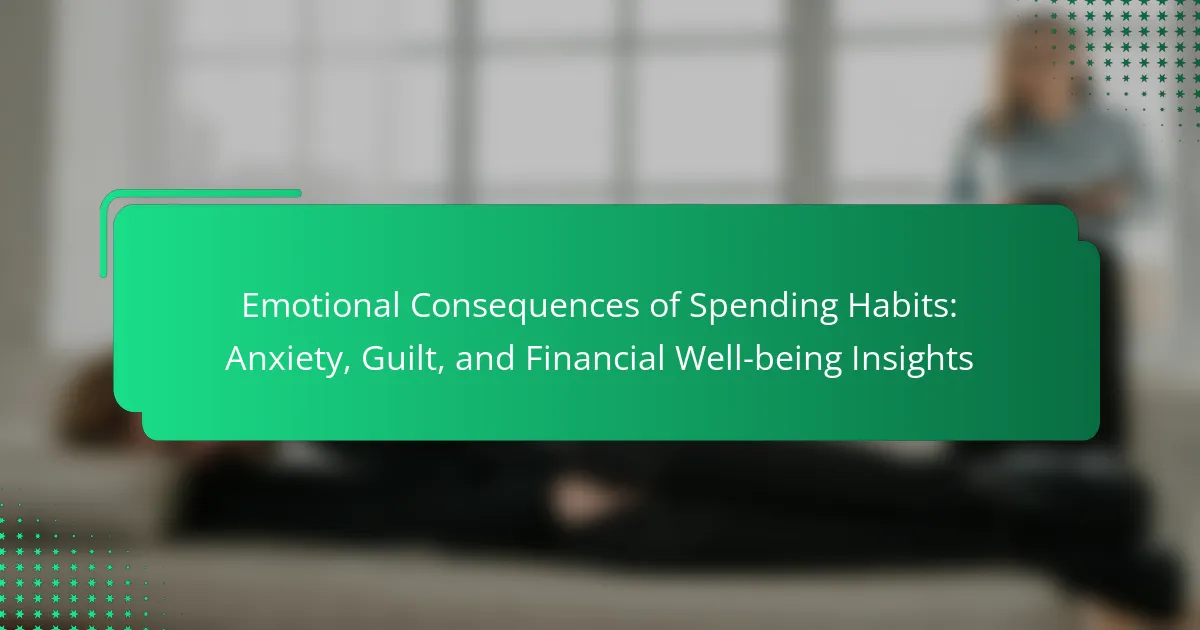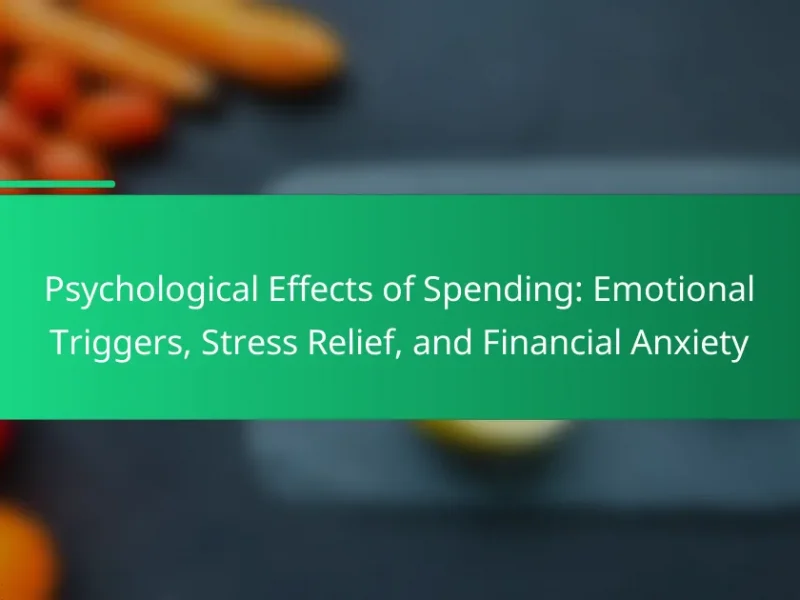Understanding the emotional consequences of spending habits is crucial for improving financial well-being. Anxiety often stems from overspending and debt, while guilt arises from impulsive purchases. Financial insecurity and societal pressure can exacerbate these feelings, impacting mental health. Addressing these emotional challenges through mindful spending can lead to greater stability and satisfaction.

What are the emotional consequences of spending habits?
Spending habits can lead to significant emotional consequences, including anxiety and guilt. These feelings often stem from financial stress and the pressure to maintain a certain lifestyle. Anxiety can arise from overspending or accumulating debt, while guilt may follow impulsive purchases that contradict personal values or financial goals.
Research indicates that individuals with poor spending habits often report lower financial well-being. This correlation highlights the impact of financial stress on mental health. As a result, addressing spending habits can improve emotional stability and overall life satisfaction.
How does anxiety manifest in financial decision-making?
Anxiety significantly influences financial decision-making by causing impulsive purchases and avoidance behaviors. Individuals may experience heightened stress, leading to poor budgeting and increased debt. Research indicates that anxiety can distort risk perception, making people overly cautious or reckless with their finances. As a result, this emotional state often undermines financial well-being and long-term planning.
What role does guilt play in spending behaviors?
Guilt significantly influences spending behaviors by prompting emotional responses that can lead to impulsive purchases. Individuals often experience guilt after spending, especially if it contradicts their financial goals. This emotional consequence can create a cycle where guilt leads to further spending as a coping mechanism. Research indicates that guilt can also drive individuals to seek immediate gratification, overshadowing long-term financial well-being. Understanding this relationship helps in developing healthier spending habits.
How do spending habits affect overall financial well-being?
Spending habits significantly impact overall financial well-being by influencing emotional states like anxiety and guilt. Poor spending choices can lead to stress, affecting mental health and financial stability. For instance, individuals who overspend often experience guilt, which can create a cycle of anxiety about finances. This emotional toll can hinder effective budgeting and saving, ultimately compromising financial well-being. Understanding the connection between spending behaviors and emotional consequences is crucial for improving financial health.

What universal factors contribute to anxiety related to money?
Emotional consequences of spending habits, such as anxiety, stem from various universal factors. Key influences include financial insecurity, societal pressure, and personal values. Financial insecurity often leads to heightened anxiety as individuals worry about their ability to meet basic needs. Societal pressure can create guilt related to spending, driving individuals to compare their financial situations with others. Personal values also play a role, as those who prioritize frugality may experience anxiety when they perceive their spending as excessive. Understanding these factors can enhance financial well-being and reduce emotional distress.
How does financial stress influence mental health?
Financial stress significantly affects mental health, often leading to anxiety and guilt. Spending habits can create a cycle of emotional distress, impacting overall financial well-being. Research indicates that individuals experiencing financial strain report higher levels of anxiety and depression. The unique attribute of guilt associated with spending can further exacerbate mental health issues, creating a feedback loop of negative emotions. Addressing these emotional consequences is crucial for improving both mental health and financial stability.
What are common triggers for spending-related guilt?
Common triggers for spending-related guilt include impulsive purchases, societal pressure, unmet financial goals, and emotional spending. Impulsive purchases often lead to regret when individuals realize they did not need the item. Societal pressure can create a sense of inadequacy, prompting excessive spending to keep up with peers. Unmet financial goals, such as saving for a house or paying off debt, can intensify feelings of guilt when spending occurs. Emotional spending, driven by stress or sadness, frequently results in guilt once the initial emotional relief fades.

What unique emotional responses arise from impulsive spending?
Impulsive spending often triggers unique emotional responses such as anxiety and guilt. These feelings can stem from the immediate gratification of purchases, followed by regret and financial stress. Research indicates that individuals may experience heightened anxiety when reflecting on their financial decisions, leading to a cycle of negative emotions. Guilt can arise from the conflict between desires and financial responsibilities, impacting overall financial well-being. Addressing these emotional consequences is essential for healthier spending habits and improved mental health.
How does impulsive spending correlate with anxiety levels?
Impulsive spending often correlates with heightened anxiety levels. Individuals may engage in impulsive purchases as a coping mechanism to alleviate stress, leading to a cycle of temporary relief followed by guilt and financial strain. Research indicates that people with anxiety disorders are more prone to impulsive buying behaviors, which can exacerbate their emotional distress. This relationship highlights the need for effective financial management strategies to promote emotional well-being.
What are the psychological effects of buyer’s remorse?
Buyer’s remorse can lead to anxiety, guilt, and reduced financial well-being. These emotional consequences often stem from the realization that a purchase may not align with personal values or financial goals. Anxiety manifests as worry about future financial stability, while guilt arises from feelings of irresponsibility. Research indicates that nearly 50% of consumers experience buyer’s remorse, impacting their overall satisfaction and mental health. Addressing these feelings can involve reassessing spending habits and focusing on long-term financial goals.

What rare emotional impacts can result from financial decisions?
Financial decisions can lead to rare emotional impacts such as shame or isolation. Individuals may experience shame when they perceive their spending habits as irresponsible, affecting self-esteem. Isolation can arise when financial stress leads to withdrawal from social interactions, creating a cycle of loneliness. These emotional consequences can significantly influence overall financial well-being and mental health. Understanding these impacts is crucial for developing healthier spending habits and fostering emotional resilience.
How can financial decisions lead to feelings of shame?
Financial decisions can lead to feelings of shame due to their impact on self-worth and societal expectations. Poor spending habits often create anxiety and guilt, especially when individuals compare themselves to others. This emotional turmoil can stem from overspending, debt accumulation, or financial instability. As a result, individuals may feel inadequate or embarrassed about their financial situation, which can further affect their overall well-being. Addressing these feelings is crucial for achieving financial health and emotional resilience.
What are the long-term mental health consequences of financial instability?
Long-term financial instability can lead to significant emotional consequences, including heightened anxiety and persistent guilt. These feelings can severely impact overall financial well-being. Research indicates that individuals facing ongoing financial stress often experience chronic anxiety, which can manifest as insomnia, depression, and diminished quality of life. Guilt associated with spending habits can further exacerbate mental health issues, creating a cycle of negative emotions. Addressing these emotional consequences is crucial for improving financial well-being and mental health outcomes.

How can individuals improve their financial decision-making to enhance emotional well-being?
Improving financial decision-making enhances emotional well-being by reducing anxiety and guilt associated with spending. Individuals can adopt mindful budgeting, track their expenses, and prioritize needs over wants. This approach fosters a sense of control and reduces impulsive purchases, leading to greater financial stability. Research shows that individuals who practice conscious spending report higher levels of satisfaction and lower anxiety levels. Building a financial plan that aligns with personal values can also contribute to long-term emotional well-being.
What best practices can help mitigate anxiety and guilt in spending?
To mitigate anxiety and guilt in spending, adopt a mindful approach to financial decisions. Track expenses to understand spending patterns, set clear budgets, and prioritize needs over wants. Practice gratitude for what you have, which can shift focus from consumption to appreciation. Engage in discussions about financial feelings with trusted individuals to alleviate emotional burdens.
What common mistakes should be avoided in managing financial emotions?
To manage financial emotions effectively, avoid these common mistakes: neglecting emotional triggers, overspending for temporary relief, failing to set financial goals, and ignoring the impact of social influences. Recognizing these pitfalls enhances financial well-being and reduces anxiety and guilt associated with spending.
How can seeking professional help improve financial and emotional health?
Seeking professional help can significantly enhance both financial and emotional health by addressing underlying issues. Therapy can reduce anxiety and guilt associated with spending habits, leading to improved financial well-being. A study found that individuals who engaged in therapy reported a 30% decrease in anxiety levels, which positively impacted their financial decisions. Moreover, financial counseling can provide tools to manage budgets effectively, reducing stress and fostering a sense of control. This dual approach not only alleviates emotional burdens but also promotes healthier spending behaviors, resulting in overall improved life satisfaction.


